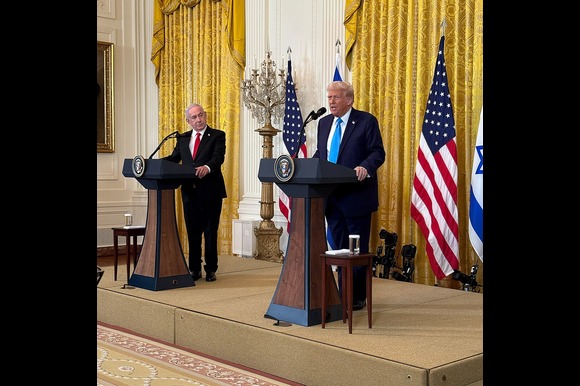Israeli Prime Minister Benjamin Netanyahu announced Monday that he has formally nominated former U.S. President Donald Trump for the Nobel Peace Prize, presenting Trump with a letter addressed to the Nobel Committee during a dinner at the White House.
The nomination comes at a contentious moment, as Israel continues its military campaign in Gaza, which has resulted in the deaths of at least 57,523 Palestinians. The ongoing conflict has drawn widespread international criticism, especially following the International Criminal Court’s (ICC) decision last year to issue arrest warrants for Netanyahu and former Israeli Defense Minister Yoav Gallant. The ICC cited alleged war crimes and crimes against humanity, accusing both men of having “intentionally and knowingly deprived the civilian population in Gaza of objects indispensable to their survival,” including essential supplies such as food, water, medicine, fuel, and electricity.
“He’s forging peace as we speak, in one country, in one region after the other,” Netanyahu said in praise of Trump during their meeting. Trump, who has previously received several nominations for the Nobel Peace Prize from allies and political supporters, has long expressed frustration at being passed over for the prestigious accolade.
Throughout his political career, Trump has criticized the Norwegian Nobel Committee for overlooking his diplomatic efforts. He has pointed to his role in mediating disputes between India and Pakistan, as well as Serbia and Kosovo, as examples of why he deserves the award.
In 2024, Trump asserted that he was more deserving of the Nobel Peace Prize than former President Barack Obama, who was awarded the honor in 2009. Trump has repeatedly voiced dissatisfaction over what he calls an unfair snub by the Nobel selection process, stating that “anybody else” in his position would have been recognized.
In a related development, Pakistan earlier this year considered nominating Trump for the Nobel Peace Prize, acknowledging his diplomatic role in de-escalating a potentially catastrophic conflict between India and Pakistan. Following U.S. intervention, both nuclear-armed neighbors pulled back from the brink of war, prompting Pakistan to consider the move as a gesture of recognition.
However, the nomination became a source of domestic controversy in Pakistan after the U.S. joined Israel in a military campaign against Iran, which included airstrikes on three Iranian nuclear facilities. The decision to consider Trump for the Nobel Prize was met with backlash from Pakistani lawmakers, activists, writers, and former diplomats, many of whom condemned it in light of his role in escalating another regional conflict.
The Jamiat Ulema-i-Islam-Fazl (JUI-F), a major political party in Pakistan, even submitted a resolution in the Senate seeking to rescind the nomination decision. Despite the outcry, no formal withdrawal occurred, as Pakistan had not officially filed Trump’s nomination with the Nobel Committee.
White House Press Secretary Karoline Leavitt addressed the nomination during a recent press briefing, saying, “President Trump has delivered wins for the American people,” and cited Pakistan’s consideration of his candidacy as evidence of international recognition. Leavitt specifically pointed to the U.S.-brokered ceasefire between India and Pakistan, stating, “Pakistan nominated President Trump for the Nobel Peace Prize in recognition of his decisive diplomatic intervention to prevent a nuclear war between India and Pakistan.”
Trump has also credited himself with helping to maintain peace in other volatile regions, including between Egypt and Ethiopia during the Nile dam dispute. Furthermore, he continues to promote his involvement in brokering the Abraham Accords, a series of landmark agreements aimed at normalizing diplomatic ties between Israel and several Arab states, including the United Arab Emirates and Bahrain.
Campaigning on a platform of diplomacy and global conflict resolution, Trump has positioned himself as a “peacemaker” capable of ending major wars through negotiation. He has frequently claimed that his leadership could have prevented or ended the wars in Ukraine and Gaza. However, both conflicts continue to rage more than five months into his presidency, raising questions about the effectiveness of his diplomatic approach.
Despite the ongoing violence in Gaza and Trump’s mixed foreign policy record, Netanyahu’s nomination places Trump once again in the spotlight of global recognition efforts. Whether the Nobel Committee will consider his candidacy amid such polarizing circumstances remains to be seen.






